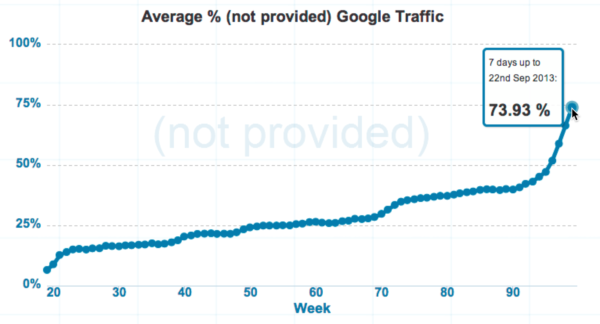If you've happened to look at your organic search traffic numbers in Google Analytics lately, you've likely seen a puzzling trend. It's quite likely the most searched term leading visitors to your website is "not provided." Huh?
Since October of 2011, Google has slowly waged a campaign to remove all search data from analytics for users logged in to Google products. Of course, Google has done everything within their power to increase the market share of their Chrome browser, Gmail, Google Docs, Google+ and more, to get you logged in while you're on the web. What this does is create an ever expanding group of people whose search terms will not show up in your Google Analytics. After the recent NSA spying allegations, Google has basically come right out and said that they'll be encrypting all future organic searches, meaning soon the only search terms coming from Google will be "not provided."
Of course, Google maintains that this is for your security. After the recent NSA spying scandal, where many have accused Google of being complicit in offering up information. With smaller players like Duck Duck Go accusing Google of being lax on security, Google has the perfect opportunity to get a public relations win on that front, but also make a move that has many marketers screaming bloody murder.
Few things are more valuable to webmasters and online marketers than knowing the intention of the users hitting their web pages. If a large number of visitors are searching for "blue high heels" when they land on your page dedicated to high heels and analytics shows that they're leaving your site in droves, you can change your page to more prominently feature blue high heels. This is the beautiful simplicity of analytics and search data in improving the web for everyone.
However, the only way that Google will be offering up any of this information now is for paid search using their AdWords platform. So if you really want to know who's hitting your site and for what terms, you'll have to pay for that traffic. Otherwise, you can try to cobble together information from your landing pages with the semi-accurate numbers made available in Google Webmaster Tools and make an educated guess as to who's getting to your site and why.
The data's dead, and there's not much we can do about it at this point. If you own a website, like most marketers you lean heavily on your analytics, making this a big blow to your efforts. But the good news, for Google at least, is that this will play well as public relations fodder and also boost expenditures on AdWords, as Google tries to wring every last cent out of that platform as it possibly can.
